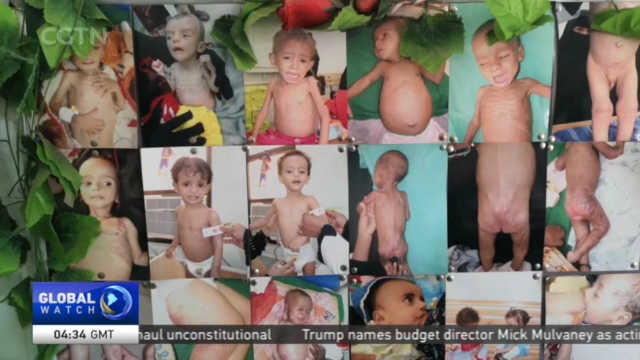
13:05, 15-Dec-2018
Inside Yemen: Lack of food leads to humanitarian crisis
Updated
12:17, 18-Dec-2018
02:25

In Yemen, more than eight million people are at risk of starving. This has caused what is currently the world's worst humanitarian crisis. We take a closer look at the lack of adequate food sources and subsequent famine in Yemen. Some of the images you are about to see may be disturbing.
This ward at Aden's Al Sadaka hospital treats severe acute and chronic malnutrition. Dr. Aida Alsadeeq works here and with the World Health Organization to establish the internationally-recognized indicators for different degrees of malnutrition.
She is currently pushing to expand those categories past minus 3 to reflect the severity of cases that she is seeing.
DR. AIDA H.M. ALSADEEQ PEDIATRIC CONSULTANT "What we have found recently is that the cases are very very severely mal-nutrition. If we have another column of less than 5,6,7 this is the cases which we found recently."
Every room is filled with multiple patients.
"Look how severe she is."
16-month-old Tasmine and her mother are internally displaced people from the city of Taiz, which experienced some of the worst fighting.
"She came with severe acute malnutrition for nutrition rehabilitation and complicated with acute watery diarrhea. That is why the IV fluid is here."
4-month-old Mohammed Abdu is from Houdaidah. He may have survived constant airstrikes on his village, but now he is fighting starvation.
This hospital reflects the very dire conditions across the country.
Most of Yemen's trade and food aid was coming through the country's western port city of Houdaidah until the Saudi coalition began restricting imports and bombing the area.
Roughly 18 million of Yemen's 27 million people require full food assistance while over 8 million are at risk of starvation.
This has pushed Yemen to the brink of famine as the need for food and other humanitarian aid across the country increase steadily.
NATALIE CARNEY ADEN, YEMEN "Aid agencies accuse both warring sides of using food and aid as a weapon and fear that restricting access to them could kill more people than all the guns, bombs and airstrikes put together. Natalie Carney, CGTN, Aden, Yemen."

SITEMAP
Copyright © 2018 CGTN. Beijing ICP prepared NO.16065310-3
Copyright © 2018 CGTN. Beijing ICP prepared NO.16065310-3